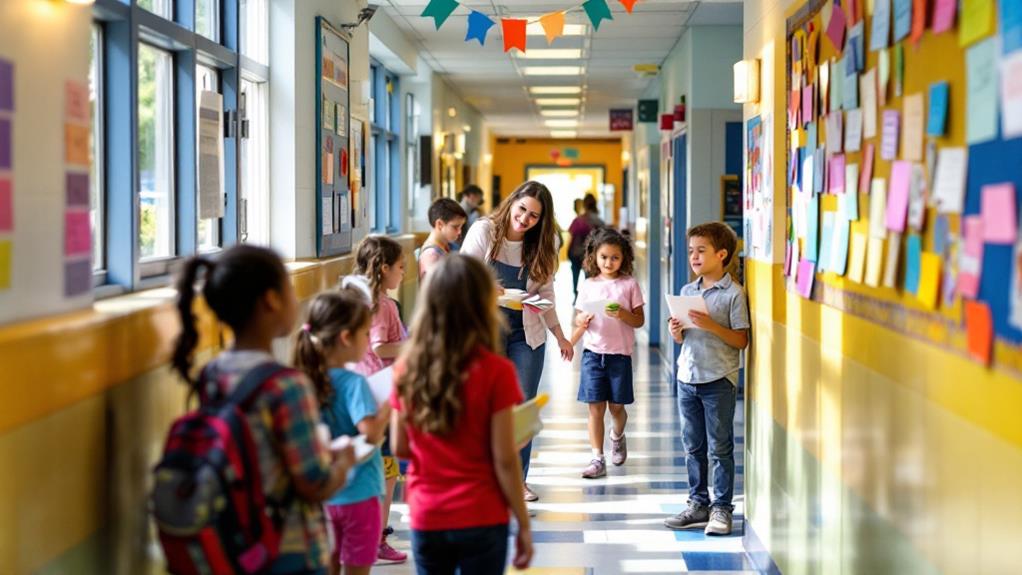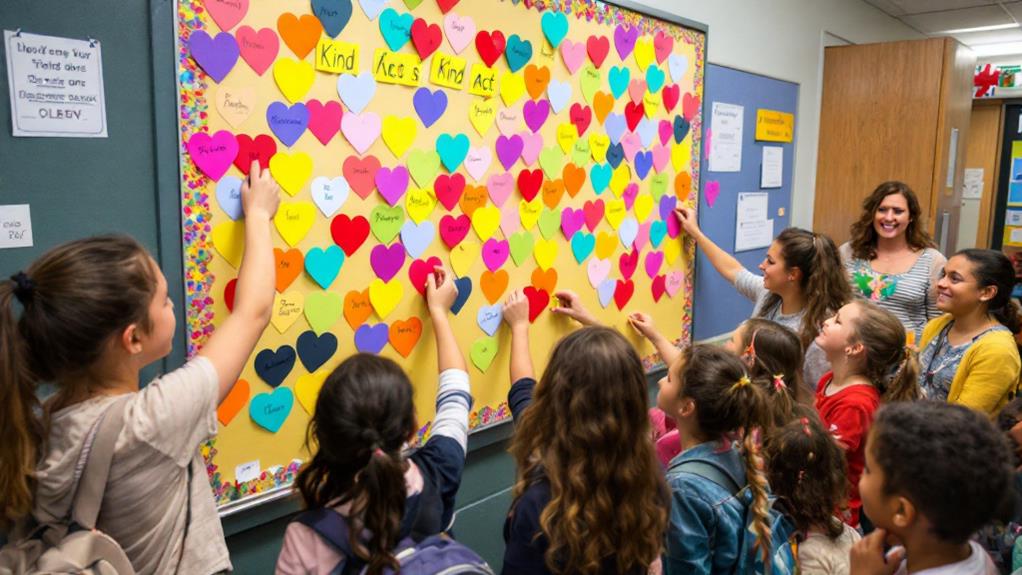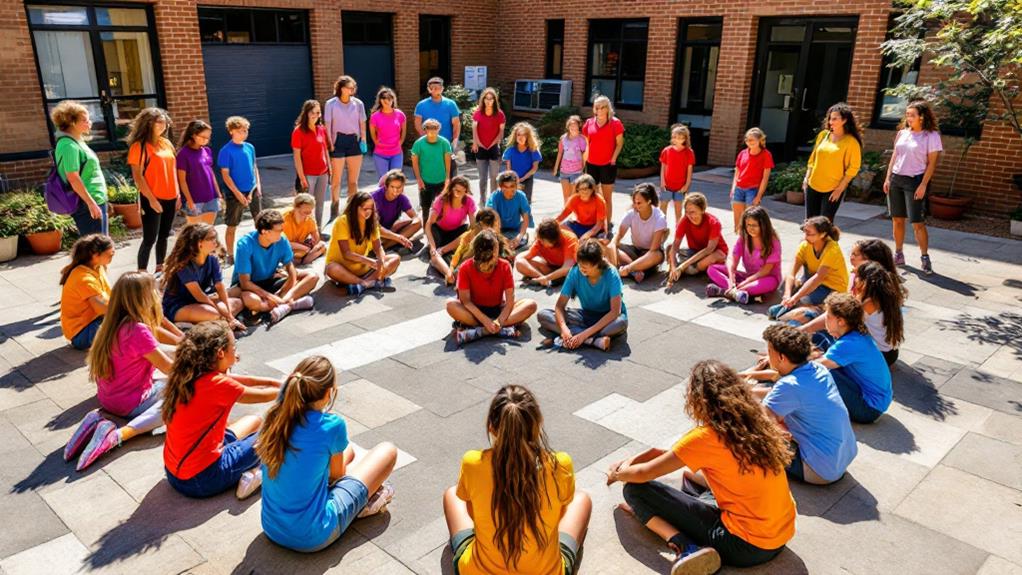How to Encourage Random Acts of Kindness in Schools

To encourage random acts of kindness in schools, start by implementing a kindness challenge with checklists and rewards. Create a kindness club where students can plan and organize events. Recognize kind acts through programs like "Caught Being Kind" and "Kindness Champion" awards. Integrate kindness into the curriculum across subjects and host school-wide events like kindness fairs or assemblies. Partner with local organizations to support kindness initiatives and provide resources. Enable student leaders to champion kindness through ambassador programs and student-led projects. By cultivating a culture of compassion, you'll create a positive school environment that extends beyond the classroom walls.
Create a Kindness Challenge
One effective way to encourage random acts of kindness in schools is by creating a Kindness Challenge. You can implement the Great Kindness Challenge, a proven program that motivates students to complete 50 acts of kindness during a designated week. Provide checklists of kind acts for students to track their progress, encouraging them to engage in random acts of kindness throughout the school day.
To make the challenge more engaging, consider creating a kindness bulletin board where students can share their experiences and inspire others. You can also organize schoolwide Kindness events, such as Kindness Bingo or Kindness Rocks painting sessions, to nurture a sense of community and excitement around kind behavior.
Involve teachers by integrating kindness-focused lessons and activities into the curriculum. This approach helps reinforce the importance of compassion and empathy. Don't forget to include families and local businesses in the challenge to create a positive ripple effect beyond the school walls. By implementing a well-structured Kindness Challenge, you'll not only encourage random acts of kindness but also cultivate a more compassionate and supportive school environment.
Establish a Kindness Club
To further promote random acts of kindness in schools, establishing a Kindness Club can be incredibly effective. This dedicated space allows students to collaborate on planning and organizing acts of kindness within the school and broader community. By creating a Kindness Club, you'll provide a platform for students to develop service projects, volunteer opportunities, and initiatives that spread positivity and cultivate a culture of kindness.
Encourage students to become ambassadors and role models through the club, inspiring their peers to engage in random acts of kindness. The club can host school-wide events, challenges, and campaigns that promote kindness, nurture connections, and celebrate the positive impact of kind behaviors. This approach not only encourages students to participate in acts of kindness but also helps shape the overall school culture.
Implement Kindness Recognition Programs

After establishing a Kindness Club, implementing kindness recognition programs can greatly enhance the impact of random acts of kindness in schools. To encourage more students to participate, you can create a "Caught Being Kind" program that recognizes those who go above and beyond in showing compassion. This initiative helps teach kids the importance of kindness and its positive effects on the school community.
Introduce a "Kindness Champion" award to honor students who consistently make a difference through their acts of kindness. To further promote emotional learning, set up a "Kindness Wall" or bulletin board where students can post notes appreciating their peers' kind deeds. Organize a school-wide "Acts of Kindness Day" or even a month-long celebration with various activities and challenges to encourage random acts of kindness.
To maximize the impact, partner with local businesses or community organizations to provide rewards for students recognized for their kindness. These incentives can include gift cards or special privileges, motivating more students to participate. By implementing these recognition programs, you'll create a culture that values and celebrates kindness, inspiring students to make a positive impact on their school community.
Integrate Kindness Into Curriculum
Integrating kindness into the curriculum takes the concept beyond recognition programs and embeds it deeply into students' daily learning experiences. You can incorporate kindness-themed lessons across subject areas, reinforcing empathy, compassion, and helping others. Align kindness and service learning projects with academic standards to demonstrate real-world applications of kind acts.
Host classroom discussions on the positive impact of random acts of kindness on individuals and communities. Encourage your students to reflect on their experiences and share perspectives. Invite guest speakers from organizations like the Acts of Kindness Foundation to inspire students to take action.
Create a kindness chain or bulletin board featuring positive messages and stories of random acts of kindness. Provide opportunities for students to plan and execute kindness initiatives within the school and local community. Make Kindness the cornerstone of your inclusive school culture by incorporating kindness cards and encouraging students to perform and document their kind acts.
Organize School-Wide Kindness Events

School-wide kindness events offer a powerful way to promote a culture of compassion and generosity throughout the entire institution. You can make a significant impact by organizing an Acts of Kindness Week or Month, encouraging students to spread positivity around the school and community. Put together a Kindness Challenge, where students compete to perform the most kind deeds, nurturing a spirit of friendly competition while making the world around them a little bit better.
To engage students further, coordinate a Kindness Fair with interactive booths and activities that promote empathy and service to others. This event can be a fun and educational way for students to participate in various kindness-related activities. On the Last Day of your kindness initiative, host a Kindness Assembly featuring inspirational speakers and student performances to celebrate the positive impact made.
Consider implementing these ideas to make your kindness events more engaging:
- Create a "Kindness Wall" where students can post notes about kind acts they've witnessed
- Organize a "Random Acts of Kindness Scavenger Hunt" around the school
- Set up a "Kindness Photo Booth" for students to take snapshots with kindness-themed props
Foster Community Partnerships
A strong network of community partnerships can amplify your school's kindness initiatives. Reach out to local businesses, non-profit organizations, and community leaders to sponsor kindness projects and contribute resources. You'll find that many are enthusiastic to support positive efforts around kindness in schools.
Partner with places of worship, youth groups, and service clubs to co-host events that encourage students to do something kind for others. Seek donations or prizes from community members to recognize students who sprinkle kindness throughout their day. These rewards can be a powerful motivator and help students feel good about their actions.
Invite guest speakers, such as community leaders or local role models, to share their experiences with kindness and inspire your students. Their stories can have a significant impact on young minds. Don't forget to connect with your PTA/PTO, school district, and local government to align kindness efforts across the community. Use social media to showcase these partnerships and spread the message of kindness beyond school walls. By involving the wider community, you'll create a lasting culture of kindness that extends far beyond your school staff and students.
Empower Student Leadership

While community partnerships can enhance kindness initiatives, true change often starts from within. Nurturing student leadership is key to cultivating a culture of kindness in schools. By establishing a student-led Kindness Club, you'll create a platform for students to organize school-wide kindness initiatives and inspire their peers through random acts of kindness.
Appointing Kindness Ambassadors from each grade level guarantees that role models are present throughout the student body. These ambassadors can champion kindness and lead by example, encouraging community involvement and peer-to-peer inspiration. Enable students to share their personal stories and ideas through kindness-focused presentations and assemblies, promoting a deeper understanding of the impact of kindness.
To maximize school-wide engagement, encourage student-driven projects and collaborative efforts:
- Create kindness-themed artwork for display
- Organize kindness challenges or competitions
- Implement student-suggested random acts of kindness




